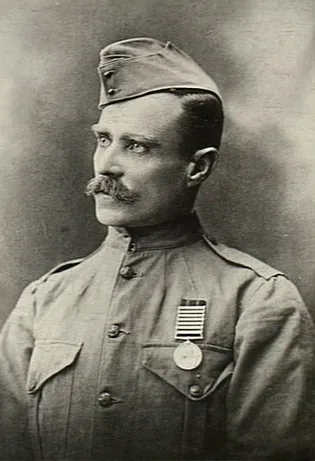Richard Henry Chase
Richard Henry Chase was born in Barbados, in the West Indies. On enlisting, he stated his birth date was 10 October 1867, making him 47. When he was killed, six months later, his brother, who was his nearest living relative, claimed that he was in fact 55. When Richard had joined 16th Battalion of the AIF on 14 October 1914, the upper age limit for recruits was 35.
Richard was educated in England and then became a mercantile marine apprentice before working as a midshipman. He served with the Natal Mounted Police and the Bechuanaland Field Force in South Africa in 1884–85 before he, with his two brothers, sailed to Australia.
He was living in Western Australia when he joined the 2nd Western Australian Contingent (1900) and then the 2nd Scottish Force (1901–02) in the Boer War. During the latter, he received the Queen’s South Africa Medal with seven clasps.
When enlisting in 1914, Richard gave his trades as fruit grower and civil servant. He embarked on HMAT Ceramic at Melbourne on 22 December, bound for the Middle East. After two months in Egypt, his transport ship, Haidar Pascha, departed Alexandria for Lemnos on 12 April 1915. The troops slept aboard the ship in Mudros Harbour until they sailed for Gallipoli on 25 April.
Private Chase’s diary gives a sense of an impatient and ambitious man, hopeful for promotion and disappointed he was not made lance corporal with others before the Gallipoli landings. His expectations and bitterness could be perhaps explained by his age and military experience, compared with that of most of the volunteer soldiers.
Richard’s transport ship was among the last to arrive off Gallipoli. The final entry in his diary notes he went ashore on the morning of 26 April. Platoon sergeant William Allan’s letter to Richard’s family details his final actions during which he was killed by enemy fire on Pope’s Ridge on 27 April 1915. He noted that the loss of Richard was ‘a great blow’: ‘If there was anything to be done he was one of the first to volunteer, always punctual and willing’.
